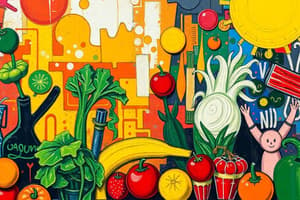Podcast
Questions and Answers
What is a characteristic of the current global industrial food regime?
What is a characteristic of the current global industrial food regime?
- It is inherently undemocratic and concentrated in power. (correct)
- It promotes local food production over international trade.
- It relies solely on government regulations for food safety.
- It encourages democratic participation among all citizens.
How many companies dominate 55% of the global seed market?
How many companies dominate 55% of the global seed market?
- Fifteen
- Twenty
- Five
- Ten (correct)
What term does Michele Micheletti use to describe actions that express dissatisfaction with corporate control?
What term does Michele Micheletti use to describe actions that express dissatisfaction with corporate control?
- Market responsiveness
- Consumer activism
- Political consumerism (correct)
- Ethical sourcing
What challenge do marginalized people face in relation to food initiatives?
What challenge do marginalized people face in relation to food initiatives?
What do eaters concerned with 'food from nowhere' aspire to recreate?
What do eaters concerned with 'food from nowhere' aspire to recreate?
Why are individual actions insufficient in countering the influences of liberalized markets?
Why are individual actions insufficient in countering the influences of liberalized markets?
What is emphasized as essential for transforming the current food system?
What is emphasized as essential for transforming the current food system?
Which concept highlights the necessity of viewing citizens beyond just consumers?
Which concept highlights the necessity of viewing citizens beyond just consumers?
What is the primary goal of the revitalisation of local food economies according to Wendell Berry?
What is the primary goal of the revitalisation of local food economies according to Wendell Berry?
Which of the following reflects a model of community control of resources?
Which of the following reflects a model of community control of resources?
What is a key aspect of food citizenship as practiced in civic food networks?
What is a key aspect of food citizenship as practiced in civic food networks?
What do multi-stakeholder structures like food policy councils aim to create?
What do multi-stakeholder structures like food policy councils aim to create?
Which issue is highlighted as a structural problem within the food system?
Which issue is highlighted as a structural problem within the food system?
According to the content, what must unite to advocate for an alternative food system?
According to the content, what must unite to advocate for an alternative food system?
What type of movement is La Via Campesina?
What type of movement is La Via Campesina?
What is NOT a characteristic of a local food system as described in the content?
What is NOT a characteristic of a local food system as described in the content?
Flashcards
Food Democracy
Food Democracy
A movement calling for greater democratic control over the food system, challenging the current undemocratic industrial food regime.
Undemocratic Food Regime
Undemocratic Food Regime
The current global food system characterized by concentrated corporate power and limited public participation.
Global Foodways
Global Foodways
The ways food is produced, distributed, and consumed on a global scale.
Political Consumerism
Political Consumerism
Signup and view all the flashcards
Corporate Control of Seeds
Corporate Control of Seeds
Signup and view all the flashcards
Food Supply Chains
Food Supply Chains
Signup and view all the flashcards
Food from Nowhere
Food from Nowhere
Signup and view all the flashcards
Citizenship in Food System
Citizenship in Food System
Signup and view all the flashcards
Food Sovereignty
Food Sovereignty
Signup and view all the flashcards
Local Food Economies
Local Food Economies
Signup and view all the flashcards
Food Citizenship
Food Citizenship
Signup and view all the flashcards
Food Deserts
Food Deserts
Signup and view all the flashcards
Democratic Food Publics
Democratic Food Publics
Signup and view all the flashcards
La Via Campesina
La Via Campesina
Signup and view all the flashcards
What is one key way to challenge the industrial food regime?
What is one key way to challenge the industrial food regime?
Signup and view all the flashcards
What are some examples of alternative food networks?
What are some examples of alternative food networks?
Signup and view all the flashcards
Study Notes
Food Democracy
- Calls for food democracy are increasing due to the undemocratic nature of the current global industrial food system.
- The current system concentrates power in the hands of transnational agribusinesses, evident in corporate control of seed markets (55% controlled by 10 companies).
- Current food system's undemocratic quality requires the involvement of democratic food publics to transform the system.
- This requires a broader understanding of citizenship, recognizing the global nature of the problem.
Citizen vs. Consumer
- The current food regime treats consumers as subjects rather than citizens.
- Consumers are reliant on experts in the current system (food manufacturers, processors).
- Alternatives focus on rebuilding trust and authentic relationships between producers and consumers (e.g., shorter supply chains, supporting local farmers, fair trade products).
- "Political consumerism" (Michele Micheletti) is a form of resistance against corporate control.
- However, individual action is insufficient to counter global market forces & their impacts on rural livelihoods.
Challenges and Alternatives
- Local initiatives like farmers' markets and community-supported agriculture (CSA) are important but don't fully address systemic inequalities.
- Privileged groups can more easily participate in such initiatives.
- Marginalized groups often lack access or influence.
- Restructuring local food economies (e.g., food cooperatives— examples include Nueva Segovia in Nicaragua and Mondragon in Spain, urban land committees, and Greening Detroit ) are strong solutions.
- Alternative food networks and community-supported agriculture reconnect producers with consumers promoting a democratic perspective.
- Civic food networks & "food citizenship" foster behaviors supporting a more democratic food system.
- Multi-stakeholder structures (e.g., food policy councils, AMAPs) provide spaces for broader democratic debate on sustainability, justice, and viability.
Addressing Structural Problems
- The focus should be on crafting democratic food publics, rather than solely on maximizing local consumption, to address problems like food deserts and corporate control of seeds.
- Recognizing the problem as collective allows for a wider range of perspectives and solutions.
- Implementing solutions necessitates a broader view than simply localized systems to address global issues of poverty and hunger.
- Food, agriculture, and the intellectual property, free trade, and investment agreements that govern these areas, transcend national borders.
- The need for democratic food publics that extend beyond national borders.
Transnational Movements
- Transnational movements like La Via Campesina represent the global perspective of small-scale producers, pastoralists, etc., seeking food sovereignty.
- This movement represents an attempt to define food citizenship based on shared interests rather than national borders.
Studying That Suits You
Use AI to generate personalized quizzes and flashcards to suit your learning preferences.
Description
Explore the concepts of food democracy and consumer activism in this quiz. Understand the implications of global agribusiness power and the need for democratic food publics. Analyze the shift from consumerism to a focus on citizenship and the importance of supporting local, ethical food sources.




